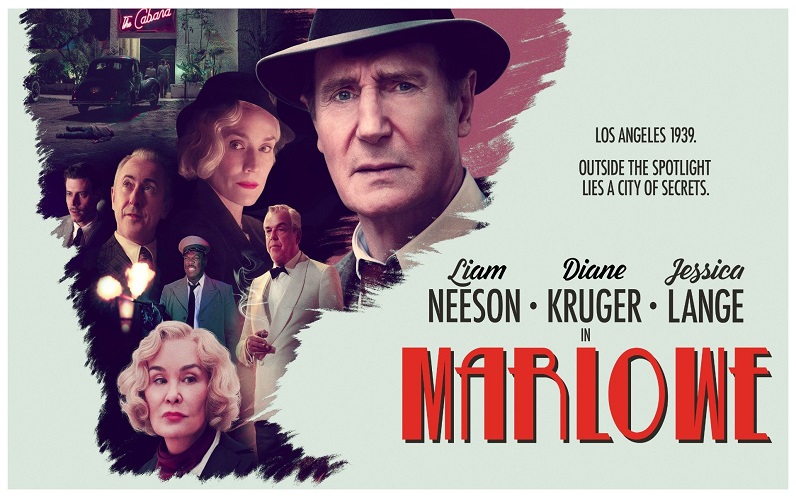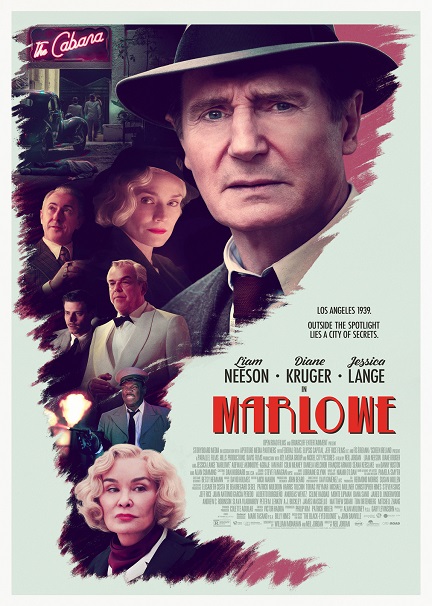Marlowe

The only task more futile for Liam Neeson than keeping his daughter from being kidnapped is cleaning the streets of Los Angeles.

Cast of Characters:
Philip Marlowe – Liam Neeson
Clare Cavendish – Diane Kruger
Dorothy Quincannon – Jessica Lange
Cedric – Adewale Akinnuoye-Agbaje
Joe Green – Ian Hart
Bernie Ohls – Colm Meaney
Lynn Peterson – Daniela Melchior
Nico Peterson – Francois Arnaud
Amanda Toxteh – Seana Kerslake
Floyd Hanson – Danny Huston
Lou Hendricks – Alan Cumming
Director – Neil Jordan
Writer – William Monahan
Based on the novel The Black-Eyed Blonde by John Banville
Producer – Philip Kim, Patrick Hibler, Alan Moloney, Gary Levinsohn, Mark Fasano & Billy Hines
Distributor – Open Road Films & Briarcliff Entertainment
Running Time – 109 minutes
Rated R for language, violent content, some sexual material and brief drug use.
The Rundown: In 1930’s Los Angeles, Philip Marlowe (Liam Neeson) is a hard-boiled private eye who’s been hired by the fetching Clare Cavendish (Diane Kruger) to investigate the disappearance of Nico Peterson (Francois Arnaud), a film crew member with whom she was having an affair. While on the case, Marlowe runs into a number of prime suspects, particularly shady nightclub owner Floyd Hanson (Danny Huston), who some believe may have even murdered Nico; however, the plot thickens when Clare’s own mother, Dorothy Quincannon (Jessica Lange), enters the picture, seeking to hire Marlowe for information on her daughter.

Initial Thoughts: Legendary crime-solving extraordinaire Philip Marlowe is a character created by detective fiction novelist Raymond Chandler that dates as far back as the ’30s. Throughout the following decades, Chandler’s works have been adapted for film many times, and has seen the character portrayed by screen legends such as Academy Award winner Humphrey Bogart (The Big Sleep) and Oscar nominees Robert Montgomery (Lady in the Lake) James Garner (Marlowe), Elliott Gould (The Long Goodbye) and Robert Mitchum (Farewell, My Lovely and The Big Sleep). Now, almost nine decades after the character first appeared, everyone’s favorite ass-kicking senior citizen Liam Neeson takes over the role, with Oscar-winning filmmaker Neil Jordan (Mona Lisa, The Crying Game, Interview with the Vampire, Greta) sitting in the director’s chair. This time, however, 2023’s Marlowe is more a fan-fiction take on the iconic gumshoe by taking Chandler’s character and adapting him into John Banville’s 2014 crime novel The Black-Eyed Blonde.
Judging from both the critical reception and box office results (or lack thereof) of his recent, late career trend of action flicks, it’s not exactly a hot take to say the Liam Neeson action formula has grown quite tired over the past 4-5 years. That said, I was kinda looking forward to this film. While the trailers didn’t necessarily impress me, I still had faith that, in the end, Jordan, Oscar-winning writer William Monahan (The Departed, Edge of Darkness) and Neeson taking a much-needed break from growling about his particular set of skills could deliver a compelling noir film.
And that faith died completely somewhere around the film’s halfway point.

The Good: I’ll say this for Marlowe, kudos to the production design and cinematography. From the sets and costumes to the overall brooding atmosphere, it’s clear much effort was put toward recreating the seamy side of 1930’s L.A., and it looks great. But that’s Neil Jordan for you. Say what you want about any of Jordan’s movies, but the one thing you never hear said is that it’s a bad looking film.
For the most part, the cast acquits themselves well, despite what little material is provided to them (more on that soon). Danny Huston, always a welcome presence, easily wins MVP here as a shady nightclub owner who’s maybe a little too transparent for his own good, earning the film’s few standout moments during his interactions with Liam Neeson. And speaking of Neeson, while this will hardly be going down as one of his all-time best performances, it is a welcome change of pace to see the 70-year-old actor drop the ludicrous action shtick and play a more age-appropriate role as the world-wearied private investigator.
If only it was in a much better film.

The Bad: In spite of what few strengths it may have going for it, for every moment that works in Marlowe, it’s followed by two to three that don’t.
Do the math there. That equals a terrible film.
Slow and deliberate pacing not only works for noir films, the genre thrives on it. It helps, though, to have a compelling story and engaging characters. That’s what allows the film to maintain your attention and keeping things moving through the slow pacing. When there’s nothing there, however, it just drags and feels so incredibly dull. To say William Monahan’s script is half-baked would be an understatement. There’s no intrigue to either the central mystery or the characters revolving around it and the final-act twists and reveals unfold predictably. That such lifeless storytelling came from the same man who wrote Martin Scorsese’s fantastic Oscar-winning crime thriller The Departed (yeah, I know, it’s a remake, but great writing is great writing whether it’s an adaptation or not) is especially disappointing.
And maybe, just maybe, all of Monahan’s missteps could’ve been forgiven had Jordan directed Marlowe with even just an ounce of energy. There are many films with predictable outcomes that are still good, great even, ’cause the journey to that outcome is captivating enough to make up for its obvious destination. Jordan, however, brings no sense of danger or urgency to the proceedings here, resulting in a stagnant crime thriller that’s as exciting as watching paint dry.
Predictability is hardly Marlowe’s biggest sin. That it’s simply uninteresting is. Yeah, it looks great, and if Jordan and Monahan put as much effort into their direction and writing, respectively, as is put into recreating the period, I might be singing a different tune here. Instead, what great visual efforts we do get ultimately amount to cake frosting without the cake, just surface level gloss covering up an empty film.

The Ugly: I hate to keep beating a dead William Monahan faced horse here, but the dialogue in this film is atrocious. Characters talk in such a silly, ham-fisted way, as if Monahan told an AI script-writing bot to write dialogue the way they talked in old gangster movies. So, we end up with gems like, “Los Angeles, the city of angels… or more like the city of dirty little secrets.” or “Hey, I’ll drop ya like a bad grammatical habit.” It’d almost work as a parody of the crime noir genre if the movie wasn’t taking itself so seriously.
Even worse, there’s an amateur repetitiveness to the way Neeson’s Marlowe speaks. Maybe that’s intentional on Monahan’s part, but that doesn’t matter, ’cause even a junior high English flunkee would be able spot something off about Neeson saying “for all intents and purposes” twice in. the. same. sentence. That, however, is nothing compared to a moment where Neeson says “fair enough” so many times in the same conversation that I swear I thought either the movie was skipping or I was in the middle of a bizarre Andy Kaufman type bit where they just keep repeating the same line over and over again.
Maybe I’m just a spoiled moviegoer, but I typically expect from Oscar winners competence that is at least higher than a Tommy Wiseau script.
Consensus: While the L.A. film noir aesthetic is on point and it’s nice to see Liam Neeson make an attempt at stepping outside his action comfort zone, Marlowe is a tiresome, sluggishly paced copy/paste retread of much better crime noir films, and a hugely disappointing entry in Neil Jordan’s mostly impressive resume.
Silver Screen Fanatic’s Verdict: I give Marlowe a D+ (★½).
